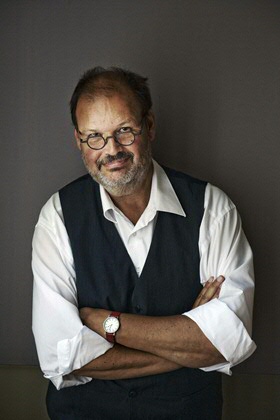Emeritus Professor Douwe Draaisma: ‘I’m a sucker for a good story’
Douwe Draaisma has written books explaining why life speeds up as you get older. Now, as he settles into retirement, he gets to experience the phenomenon first hand. Mathijs Deen travelled to Texel to meet up with the autobiographical memory expert, whose attitude to his own aging process is optimistic. He reckons he still has few books left in him.
Draaisma is fond of Texel and spends a lot of time there. Now that he has retired, it makes sense for us to meet up on the island rather than in his office in Grote Kruisstraat. During our drive through the state-owned woods on the way from his rental property to the coast, I ask him what it is that he likes so much about Texel. He can’t seem to formulate much of an answer. As we emerge from the woods, it is as if the unfolding landscape expresses what he cannot: dunes shift in the wind, as intangible as memories, while the horizon above the sea remains constant.

Cautious
The question had seemed straightforward enough to me: why does he like Texel so much? I had not expected a psychologist who has spent most of his career researching autobiographical memory (in other words, the stories people tell about their own lives) to respond so hesitantly. But perhaps I should not have been surprised. After all, if there’s one insight Draaisma has gained while exploring the human spirit, it is that when people are asked about their own life history, they often resort to telling themselves a story – preferably one with a beginning and an end, a decent structure and an interesting plot. ‘If you’re looking for people with an understanding of our inner lives and how we give that expression, writers are much more use than psychologists,’ he says later, from his chair in the corner of a beach bar. ‘Writers tend to be seismographically sensitive to their inner world. That’s why I quote literature so often in my books.’
Accessible
It is remarkable, given his literary skill and the success of the books he has written, both as a researcher and a professor, that Douwe Draaisma does not consider himself a literary writer. When I ask him how he would describe himself as a writer, he just says that he ‘writes about serious issues in an accessible way.’ Well, that accessible writing style has resulted in impressive sales figures, dozens of translations and four awards, including the Jan Hanlo essay prize and the J. Greshoff prize. ‘It wouldn’t have been anything like as easy if I’d only been interested in something like, say, the temporal limits of the short-term memory,’ he explains. ‘I’m just lucky to be interested in topics that appeal to a wide audience, such as how memories are formed and why our memory deteriorates as we get older.’
Calm and collected
And that’s what Draaisma has written about the most: what people say about themselves and where they get it from. His career as a professor in the history of psychology has become a story in itself, with a beginning, a middle and an end. When asked where the story began, he starts by naming his mentors: Piet Vroon, of course (‘… who once said, à propos of nothing at all, “Douwe will end up being a professor.” I was just sitting there, one of a handful of students, in the back row …’), but especially Willem Hofstee. Hofstee was professor of psychology in Groningen until 2000. ‘My mentor, Willem Hofstee, said on one occasion, “I reckon Douwe is a calm, collected kind of guy.” I thought, that’s not me at all, but it is what I’d like to be. And strange as it may seem, the way someone else describes you somehow subtly influences your behaviour and how you feel.’ Can you explain? 'Well, you know how certain encounters or events in life turn out in retrospect to have been defining moments? This was one of those. Hofstee saw me as a calm, collected person, just steering my own course in life. That somehow gave me the courage to focus on topics that weren’t fashionable, which I can assure you required a degree of collectedness.’
High demands
So Hofstee gave you a tip: ‘As you go out into the world, stay calm and collected – that will help you to stand your ground.’ 'Yes. And I started saying similar things to my own students. Mind you, with the academic system having changed so much, I’m not sure that I would still recommend being calm and collected. Nowadays, if you want to follow the tenure-track route to becoming a professor, you have to tick loads of boxes. If I was trying to become my own successor now, being calm and collected wouldn’t get me anywhere. No, I would need to have a vision on leadership. I would have to familiarize myself with the European subsidy system and spend time writing subsidy proposals, knowing that there’s only a 5% chance of them being accepted. If in my day I had had to develop all the qualities professors are expected to have now, I certainly wouldn’t have had time to write as many books.’

Not too chatty
A mentor’s impact can last a lifetime. Even as an acclaimed professor, Draaisma still imagines Hofstee reading what he has written and hopes that he won’t be found too chatty. ‘I’m a sucker for a good story,’ he says. ‘While I’m reading up on a certain topic, I come across all sorts of anecdotes, and I confess that I do tend to allow the best stories to shape the piece I’m writing …’ Is that wrong? He hesitates. ‘No, I don’t think so, really. It certainly boosts readership. But it probably wouldn’t satisfy strict academic requirements.’
Optimistic
We say our goodbyes. As we are waiting to pay, he tells me that he views the prospect of growing old with optimism. He just hopes that his memory will hold out well enough for him to be able to keep writing for another decade or so (‘most Draaismas run out of steam when they get to about 76’). The books he still plans to write will be about familiar-sounding themes, such as why delusions defy logic and why children have imaginary friends. Asked whether he might ever consider attempting a work of fiction, his answer is resolute. ‘I’ve tried a few times and failed,’ he says. ‘My imagination always seems to follow the same unoriginal path. Boy meets girl; they go to bed. End of story.’
Douwe Draaisma was born in Nijverdal, the Netherlands, in 1953. Having graduated in psychology and philosophy from the University of Groningen, he moved on to Utrecht, where he was awarded a PhD for his dissertation, entitled De Metaforenmachine . Een geschiedenis van het geheugen (later translated as Metaphors of Memory: a history of ideas about the mind). He then returned to Groningen, where he went on to write six more books. He started his career at the UG as a lecturer in the theory and history of psychology and gained a professorship in 2003. He received several academic and literary awards for his book Waarom het leven sneller gaat als je ouder wordt (later translated as Why life speeds up as you get older).
Text: Matthijs Deen. This article has been taken from our alumni magazine Broerstraat 5.
| Last modified: | 30 April 2020 3.54 p.m. |
More news
-
16 May 2024
KNAW appoints Mladen Popović and René Veenstra as members
Professor Mladen Popović and Professor René Veenstra have been appointed members by the Royal Netherlands Academy of Arts and Sciences (KNAW).
-
01 May 2024
Behavioral Scientist Carsten de Dreu Appointed as Professor at the University of Groningen
The University of Groningen is pleased to announce the appointment of renowned social and behavioral scientist Carsten de Dreu as research professor at the UG.
-
09 April 2024
Kirsten van den Bosch: 'Connecting students with the work field really is achievable in every programme'
Dr Kirsten van den Bosch en her team won the Best Practice Award 2024 with their initiative to connect students with organizations to solve real problems within Academic Learning Communities.
